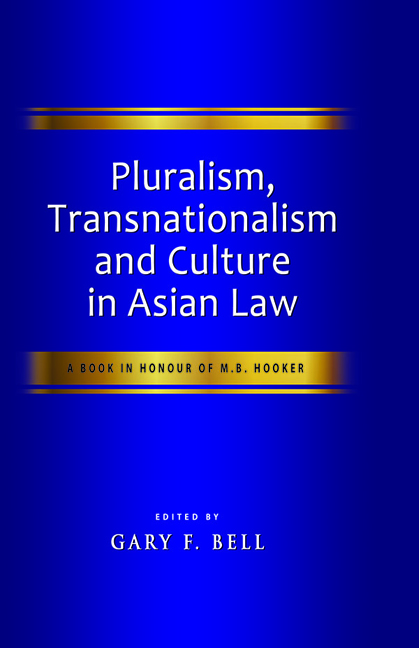Book contents
- Frontmatter
- Dedication
- Contents
- Preface
- Acknowledgements
- About the Contributors
- Chapter 1 M.B. Hooker and Southeast Asian Law: Path-breaking Passions
- Chapter 2 Asian Thought and Legal Diversity
- Chapter 3 Comparative Law, Anti-Essentialism and Intersectionality: Reflections from Southeast Asia in Search of an Elusive Balance
- Chapter 4 Legal Pluralism and Legal Anthropology: Experiences from Indonesia
- Chapter 5 Mapping the Relationship of Competing Legal Traditions in the Era of Transnationalism in Indonesia
- Chapter 6 Indonesia's Weak State Courts and Weak Law Fare Poorly in a Pluralist Commercial World
- Chapter 7 When Laws Are Not Enough: Ethics, Aesthetics, and Intra-Religious Pluralism in Contemporary Indonesia
- Chapter 8 Legal Pluralism and the Constitutional Position of East Malaysia's Indigenous Peoples: The View from the Longhouse
- Chapter 9 Sharia, State and Legal Pluralism in Indonesia: How Law Can You Go?
- Chapter 10 Negotiating Legal Pluralism in Court: Fatwa and the Crime of Blasphemy in Indonesia
- Chapter 11 Islamic Law in Israel: A Case Study in Legal Pluralism
- Chapter 12 The Road to Democracy Goes Through Religious Pluralism: The Indonesian Case and Thoughts on Post-Mubarak Egypt
Chapter 12 - The Road to Democracy Goes Through Religious Pluralism: The Indonesian Case and Thoughts on Post-Mubarak Egypt
Published online by Cambridge University Press: 12 January 2018
- Frontmatter
- Dedication
- Contents
- Preface
- Acknowledgements
- About the Contributors
- Chapter 1 M.B. Hooker and Southeast Asian Law: Path-breaking Passions
- Chapter 2 Asian Thought and Legal Diversity
- Chapter 3 Comparative Law, Anti-Essentialism and Intersectionality: Reflections from Southeast Asia in Search of an Elusive Balance
- Chapter 4 Legal Pluralism and Legal Anthropology: Experiences from Indonesia
- Chapter 5 Mapping the Relationship of Competing Legal Traditions in the Era of Transnationalism in Indonesia
- Chapter 6 Indonesia's Weak State Courts and Weak Law Fare Poorly in a Pluralist Commercial World
- Chapter 7 When Laws Are Not Enough: Ethics, Aesthetics, and Intra-Religious Pluralism in Contemporary Indonesia
- Chapter 8 Legal Pluralism and the Constitutional Position of East Malaysia's Indigenous Peoples: The View from the Longhouse
- Chapter 9 Sharia, State and Legal Pluralism in Indonesia: How Law Can You Go?
- Chapter 10 Negotiating Legal Pluralism in Court: Fatwa and the Crime of Blasphemy in Indonesia
- Chapter 11 Islamic Law in Israel: A Case Study in Legal Pluralism
- Chapter 12 The Road to Democracy Goes Through Religious Pluralism: The Indonesian Case and Thoughts on Post-Mubarak Egypt
Summary
A significant key for understanding the successful transition to democracy in Indonesia, home to the largest Muslim community in the world, is a long-standing tradition of pluralism, to use modern terms. This tradition is well-anchored in the highly diverse society of Indonesia, that has roots in local Hindu-Buddhist cultures that contain pluralistic motifs. Remarkably, pluralistic motifs have not left Islam untouched in Indonesia. According to Robert W. Hefner, the people of the Indonesian archipelago have long grappled with what social theorists today often regard as a uniquely modern issue — cultural pluralism. Thus, for centuries intellectual and organizational pluralism have been a distinctive feature of Indonesian Islam and there were diverse ideas and religious views about the way to be a good Muslim in the Malay-Indonesian world. The distinctive narrative of Islam's introduction to the Indonesian archipelago also provides insights for understanding the nature of Islam there. Formative earlier periods of this narrative, starting around the fourteenth century, are intimately connected with mystical, spiritual Sufi traditions, known for religious tolerance and an inclusive pluralistic approach. In addition, whereas the historical breakthrough of Islam was largely marked by a use of force, the process of Islamization in Indonesia and the neighbouring region was carried out largely in a peaceful way; maritime traders, Sufi teachers and Sufi orders (tarikats), as well as marriage of foreign Muslims to native women and conversion of court circles, played an essential role in this process. Hence, the spread of Islam in Southeast Asia, according to A.H. Johns, was “hesitant, modest and discreet” and “what was achieved in one century in the Middle East took virtually a millennium in Southeast Asia”. Indeed, not rarely, pluralistic values were seriously ignored and violated throughout the history of Indonesia. Notwithstanding this, a considerable resistibility of these values has enabled numerous cultures, ethnic groups, religions, social communities and language groupings to tighten together and become one nation that has survived the storms of history. Pluralistic values have also navigated Indonesia to democracy.
- Type
- Chapter
- Information
- Pluralism, Transnationalism and Culture in Asian LawA Book in Honour of M.B. Hooker, pp. 293 - 338Publisher: ISEAS–Yusof Ishak InstitutePrint publication year: 2017

